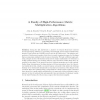Free Online Productivity Tools
i2Speak
i2Symbol
i2OCR
iTex2Img
iWeb2Print
iWeb2Shot
i2Type
iPdf2Split
iPdf2Merge
i2Bopomofo
i2Arabic
i2Style
i2Image
i2PDF
iLatex2Rtf
Sci2ools
126
click to vote
PARA
2004
Springer
2004
Springer
A Family of High-Performance Matrix Multiplication Algorithms
During the last half-decade, a number of research efforts have centered around developing software for generating automatically tuned matrix multiplication kernels. These include the PHiPAC project and the ATLAS project. The software endproducts of both projects employ brute force to search a parameter space for blockings that accommodate multiple levels of memory hierarchy. We take a different approach: using a simple model of hierarchical memories we employ mathematics to determine a locally-optimal strategy for blocking matrices. The theoretical results show that, depending on the shape of the matrices involved, different strategies are locally-optimal. Rather than determining a blocking strategy at library generation time, the theoretical results show that, ideally, one should pursue a heuristic that allows the blocking strategy to be determined dynamically at run-time as a function of the shapes of the operands. When the resulting family of algorithms is combined with a highly ...
Applied Computing | Matrix Multiplication | Matrix Multiplication Kernels | PARA 2004 | Small Matrix Multiplication |
Related Content
| Added | 02 Jul 2010 |
| Updated | 02 Jul 2010 |
| Type | Conference |
| Year | 2004 |
| Where | PARA |
| Authors | John A. Gunnels, Fred G. Gustavson, Greg Henry, Robert A. van de Geijn |
Comments (0)

